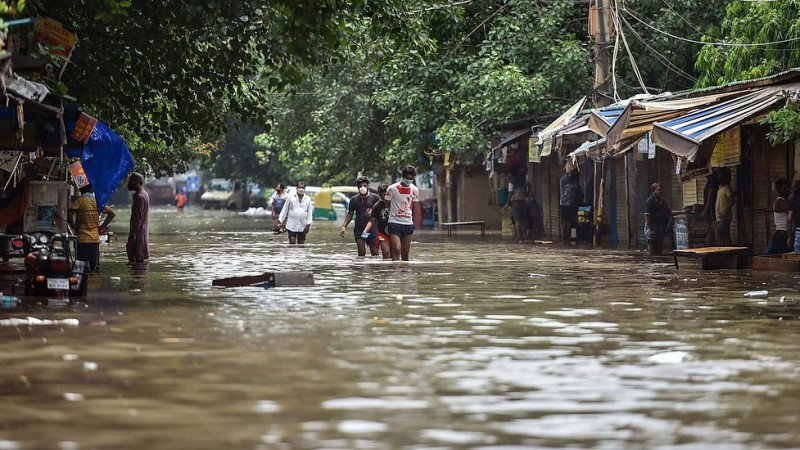
New Delhi: Delhi recently witnessed a deluge of unprecedented rainfall, revealing the limitations of the city's infrastructure in handling such extreme weather conditions. Chief Minister Arvind Kejriwal acknowledged the challenges faced by the capital's systems while urging citizens and authorities to come together rather than engaging in a blame game.
The heavy downpour resulted in severe waterlogging, flooding several low-lying areas and causing significant inconvenience to residents. Transportation networks were disrupted, with roads submerged and traffic coming to a standstill. Reports of water entering homes and shops further highlighted the extent of the crisis.
Also read:Soldier Survives Landmine Blast Near LoC: A Stark Reminder of Perils Faced by Security Forces
Chief Minister Kejriwal, addressing the situation, emphasized that Delhi's existing infrastructure was not designed to handle such an extraordinary volume of rainwater. He acknowledged the need for comprehensive improvements in the drainage and sewage systems to prevent similar situations in the future.
Kejriwal called for unity among citizens, urging them to assist each other during this challenging time. He stressed the importance of cooperation between government agencies, municipalities, and citizens to address the immediate concerns and collectively work towards long-term solutions.
The Chief Minister urged against engaging in a blame game, emphasizing that the focus should be on providing relief to affected areas and assessing the necessary steps to strengthen the city's infrastructure. He called for a comprehensive review of the drainage system and proposed enhanced measures to mitigate the impact of heavy rainfall.
Also read:Espionage Bombshell: DRDO Scientist Allegedly Leaks Indian Missile Secrets to Pakistani Agent
As the rains subsided, government agencies and municipal corporations intensified their efforts to clear waterlogged areas and restore normalcy. Pumping stations were deployed to drain out accumulated water, while teams of workers worked tirelessly to repair damaged infrastructure and ensure smooth traffic flow.
Residents of affected areas shared their grievances, expressing concerns about the recurring problem of waterlogging during heavy rains. They called for immediate action and investment in infrastructure to better prepare the city for extreme weather events.
The heavy rainfall and subsequent waterlogging also prompted discussions on climate change and the need for sustainable urban planning. Experts highlighted the importance of incorporating climate-resilient infrastructure and adopting eco-friendly measures to mitigate the impact of climate change.
Also read:PM to Sign Deal with France: 26 Rafale-M Fighters, 3 Attack Submarines
The Delhi government, in response to the situation, announced plans to revamp the drainage and sewage systems to address the challenges posed by heavy rainfall. The Chief Minister emphasized the need for long-term planning and sustainable development to ensure the city's resilience in the face of future climate-related challenges.
As the recovery process continues, authorities have urged citizens to remain cautious and take necessary precautions. They have advised against venturing into waterlogged areas and have set up helpline numbers to address emergency situations promptly.
Delhi's recent encounter with extreme rainfall has shed light on the vulnerabilities of the city's infrastructure. It serves as a wake-up call for authorities to prioritize investments in climate-resilient infrastructure and comprehensive urban planning to mitigate the impact of future weather events.
Also read:Tragedy Strikes Manipur: Policeman Killed, Ten Injured in Violent Clash
While there may be disagreements and concerns about the current state of the infrastructure, Chief Minister Kejriwal's call for unity and cooperation remains crucial. It is essential for citizens, government agencies, and stakeholders to work together, avoiding the blame game, and focusing on collective efforts to build a more resilient and sustainable Delhi.
The incident serves as a reminder that addressing the challenges posed by climate change requires a collaborative approach and a commitment to improving infrastructure to withstand extreme weather events. With sustained efforts and a collective will, Delhi can move towards a more resilient and prepared future.